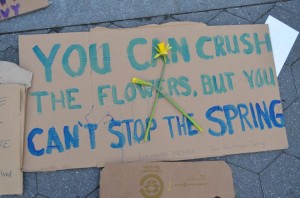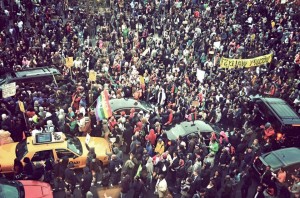If there is to be an “American Spring,” as so many of us hope, it is now possible to see its emerging boundaries: a refusal both of the failure to change the real conditions that provoked the Civil Rights movement, and of endebted or indentured life.These boundaries have become literally unspeakable in everyday life. There is no racism, we are told, and any infringement is severely reprimanded. Debt, on the other hand, is purely and simply a moral failing on the part of the debtor, unspeakable because it is shaming.
These, then, are the boundaries of the unspeakable: debt and segregation. If there is the living legacy of chattel slavery on the one side, there is the present existence of debt servitude on the other. Many are on both sides of this sorry equation, which is resolved and kept stable only by the existence of the prison-industrial complex, which is so discriminatory that it has become known as “the New Jim Crow.” This is the true “American exceptionalism”–the willingness to imprison millions, have millions more in the criminal justice system, and countless multitudes in permanent debt. None of this may be spoken, except in terms of particular cases of failure, known as “tragedies.”
If there is an American Spring, it will have the name Trayvon Martin. Just as the Egyptian uprising took the name Khaled Said to symbolize police oppression and the Tunisian revolution took that of Mohammed Bouzazi, the fruit seller who immolated himself in protest at the failure of the state. In just the same way, Trayvon Martin’s death is not a “tragedy” in the classical sense (in which the “hero” would come to grief over a tragic flaw) but the tragically likely outcome of a segregated punishment society.
The key form of that punishment other than prison is debt. By making personal and systemic endebtedness “speakable,” activists and writers from the famous, like David Graeber, to the most anonymous “We Are the 99%” Tumblr poster, or Occupy sign-maker have opened another side of the new space for political action. Personal debt from student loans, cars and credit cards now stands at $2.5 trillion. Add in mortgages at about $13 trillion and you have a good approximation of US gross national product, about $15.3 trillion. No one can imagine this to be sustainable or solvable, yet it cannot be discussed.
By giving a name to the persistence of segregation and racialized division in this country, despite and/or because of Obama’s election, the senseless death of Trayvon Martin has given that space another dimension. Please be careful to note that I do not think his death was thus “useful” in any way. Rather, this pointless act of violence has simply given a name to the pointless persistence of racialized punishment that subtends the policing of the United States.
As of this writing 1.4 million people have signed the petition for justice in Trayvon’s case in a remarkably short time. The unspeakable persistence of segregation now has a name and a moment. It does not exist as a single question of rectification. When George Zimmerman is convicted, it will be a rupture in the systemic structure of “move on, there’s nothing to see here” that has so hegemonically policed the social as a whole.
At that point, a new space to see and speak, to say what there is to see, will have formed. It will be the space for a politics in which the limits of possibility will be redrawn. The American Spring will have happened.


